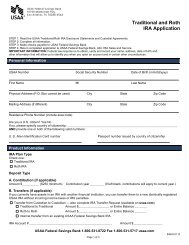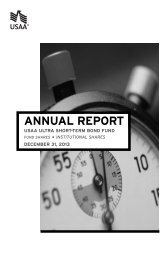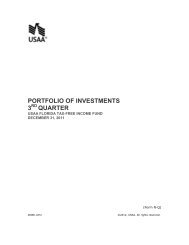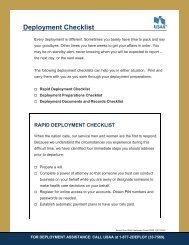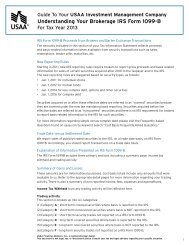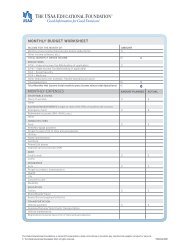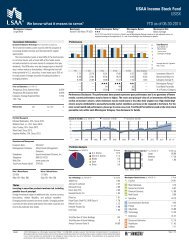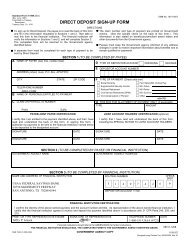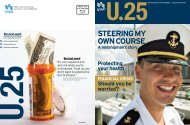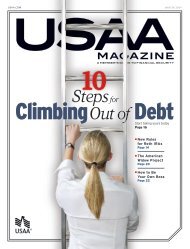MAGAZINE - USAA
MAGAZINE - USAA
MAGAZINE - USAA
Create successful ePaper yourself
Turn your PDF publications into a flip-book with our unique Google optimized e-Paper software.
When Everything Goes Down<br />
The thing that’s been so disturbing since<br />
the summer is that the prudent investor’s<br />
best friend — diversification through asset<br />
allocation — hasn’t worked. Instead of<br />
stronger asset classes balancing weaker<br />
ones, virtually every asset class has lost<br />
serious money. As bad as the U.S. stock<br />
market has been, overseas markets —<br />
especially emerging markets — have<br />
been much worse. Bonds not backed by<br />
the U.S. Treasury have also had losses.<br />
Real estate continues to be a disaster,<br />
while commodities have crashed,<br />
admittedly bringing the silver lining<br />
of lower gas prices.<br />
“The only thing asset allocation has<br />
done recently is make sure you don’t<br />
Gain may be<br />
temporary and<br />
uncertain, but<br />
ever while you live,<br />
expense is constant<br />
and certain.<br />
—Poor Richard’s Almanac by Benjamin Franklin<br />
do as badly as the worst asset class,”<br />
<strong>USAA</strong> Investment Group’s Ron Sweet<br />
states. “Outside of Treasury securities,<br />
there’s been no place to hide. That’s<br />
what happens when you have a credit<br />
crisis combined with a recession, a<br />
depressed housing market, a financial<br />
system meltdown and a global crisis<br />
of confidence.”<br />
After they opened their third-quarter<br />
investment statements, my retired mother<br />
and business-owning brother had their<br />
own take on the situation. She asked me<br />
if she’d have to go back to work at 71. He<br />
told me he was going to stop contributing<br />
to his 401(k). They are like people all<br />
over America, making crucial decisions<br />
in the midst of a national crisis of confidence<br />
about the future.<br />
Unraveling the Big, Scary Ball<br />
Before making another big decision<br />
about my portfolio, I decided to sit<br />
back and unravel the ball of fear. While<br />
the “financial crisis” has become an allencompassing<br />
term for today’s ills, it’s<br />
not that simple. There are several key<br />
elements in play, and they have to be<br />
considered individually.<br />
The first is the credit bubble that<br />
drove the housing boom and the subsequent<br />
housing bust that froze the credit<br />
markets. The critical factor turning the<br />
housing bust into a credit crisis was<br />
leverage. Just as homeowners were<br />
borrowing against rising home values,<br />
banks and hedge funds were borrowing<br />
against the inflated value of the<br />
mortgage-backed securities on their<br />
balance sheets.<br />
As home prices declined and foreclosures<br />
skyrocketed, it sparked a<br />
second key element that led to the<br />
overall crisis: banks and consumers<br />
alike scrambling for cash. That reaction<br />
created huge holes in bank balance<br />
sheets, which is what the government is<br />
currently attempting to fix by directly<br />
investing capital into the banks and taking<br />
a partial ownership position.<br />
A third big problem is the lack of<br />
trust between banks. And, again, the<br />
government has stepped in and is<br />
guaranteeing many types of common<br />
financial transactions.<br />
In fits and starts, the government’s<br />
bold action, along with coordinated<br />
steps overseas, is slowly unfreezing the<br />
credit markets. Further, concrete steps<br />
and programs are in place to support<br />
the housing market, such as the Hope<br />
for Homeowners Act of 2008 and the<br />
FHASecure plan.<br />
So does it still make sense to invest in<br />
the credit markets? Will bonds resume<br />
their traditional role as portfolio balancers<br />
and stable income<br />
providers? According to<br />
<strong>USAA</strong>’s Cliff Gladson, “The<br />
losses in the bond market<br />
were directly related to<br />
the credit crisis. With<br />
investment banks and<br />
hedge funds liquidating<br />
their bond holdings, we’ve<br />
had supply and demand<br />
imbalances that have<br />
very little to do with the<br />
essential element in the<br />
bond market — that is,<br />
the bond issuers’ ability to<br />
repay. With the exception<br />
of Lehman and WaMu, for<br />
example, the other big factor<br />
that can impact bonds<br />
is inflation, and the good<br />
news is that the combination of global<br />
recession with falling energy and other<br />
commodity prices will likely wring out<br />
whatever inflation exists. Many types of<br />
bonds are on sale, especially municipal<br />
and corporate securities.”<br />
Why the Stock Market Kept Falling<br />
Many people, me included, assumed<br />
that the government bailout would have<br />
a positive effect on stocks, but instead<br />
they just kept falling. <strong>USAA</strong>’s Ron Sweet<br />
explains why: “One big reason for the<br />
huge sell-off since mid-September —<br />
even after the bailout — is uncertainty<br />
14<br />
<strong>USAA</strong> <strong>MAGAZINE</strong> WINTER 2008 <strong>USAA</strong>.COM



